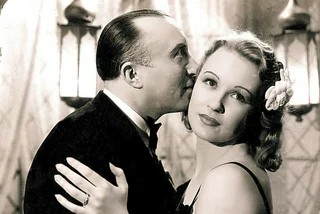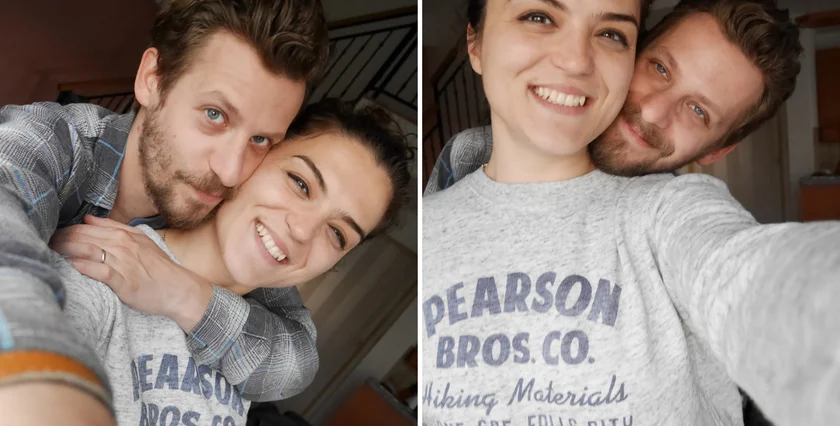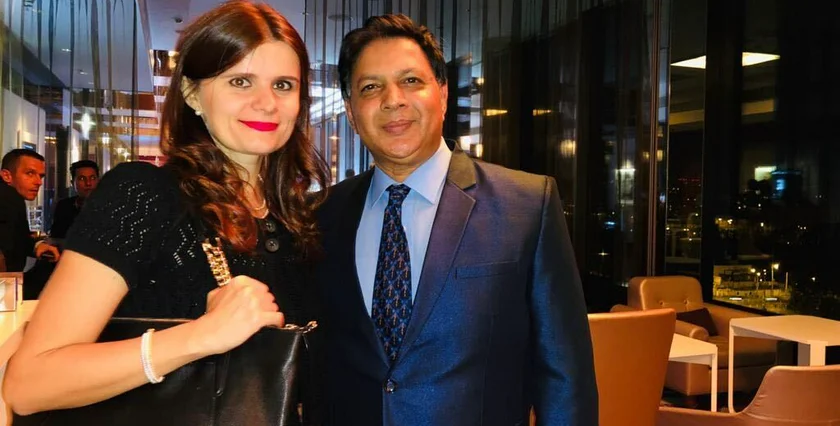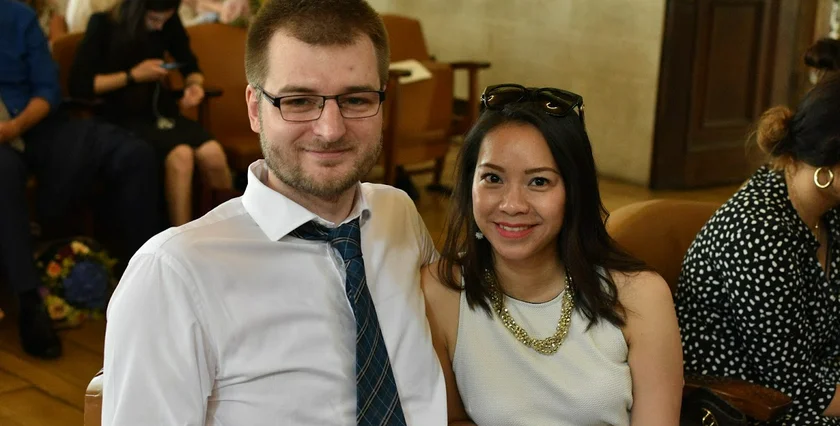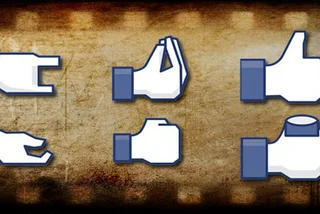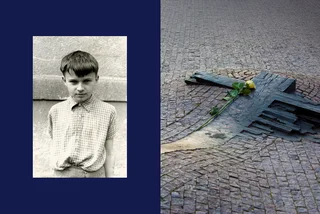If monocultural relationships are tricky, binational romance is doubly so – filled as it is with surprises, misdirections, and plain old speechless moments.
Foreign nationals make up nearly 5% of the Czech population, and in 2019, more than one-tenth (11.2%) of marriages involved at least one partner of a non-Czech nationality.
Beyond learning to communicate in a common language, these couples often struggle with cultural nuances. Since the Czechs are somewhat of a “coconut culture” (reserved on the outside, warm in the center), it can be confusing when their partners are from more of a “peach culture” (more readily open).
We spoke to foreigners living in the Czech Republic about the awkward moments that have given their Czech partner cause to cringe:
1. Filling up the silence with noise.
Czechs are not necessarily talkative, and one of the first things I learned as an American in the Czech Republic is that silence is not as uncomfortable for Czechs as it is for us. My partner says he doesn’t know what to do when I babble awkwardly to keep a conversation going (my words, not his). I was socialized to never let the conversation drop off, so it embarrasses my partner “when I keep speaking after it’s not necessary.”
While many Americans embrace the old adage, “If you don’t have anything nice to say, don’t say anything at all,” my Czech father-in-law likes to say, “If you don’t have anything interesting to say, don’t fill up my silence with your noise.” Take notice, voluble internationals: Czechs aren’t known to love chatterboxes.
2. Speaking too loudly in public.
Anna from Denmark says her Czech boyfriend always notices when she speaks too loud. Madalina, from Romania, echoes this. While she feels she’s “a hybrid of two cultures now, and have been partly assimilated into Czech culture,” she’ll never forget the time her boyfriend told her not to raise her voice while speaking on the phone on public transportation. She feels eyes on her even when she’s not being loud, so she avoids talking on the tram in general!
3. Speaking English too loudly in public.
Though the contingent of internationals in the Czech Republic is growing, it's still a relatively homogenous country. That means it’s common to field surprised looks from Czechs of all ages when you speak in English (or any other languages). Both Rochelle from South Africa and Kingsley, a British-born Nigerian, say they’ve gotten stares while in restaurants, walking on the street, and in public transport when speaking with their partners, which makes their Czech partner feel shy from the added attention.
While we're not advocating that you change the way you speak, Kingsley says it helps to pepper his English with Czech, which locals are more likely to find “cute” and take to him more kindly.
4. Our need to hug people we've just met.
Czechs aren’t the touchy-feeliest bunch, which Laila from the Levant found out when she tried to greet Czechs at the pub in this unfamiliar way. “We’re high-contact people where I come from, and it took awhile for me to stop having anxiety when going out with my partner and not being able to shake hands or hug others.”
Before coronavirus, of course, “there’d usually be ten people and I’d come and shake hands with all, which for them was awkward. Eventually I found out that the warmest greeting was to keep nodding your head for 15 minutes. It caused me stomach pain!”
A gallery of Expats.cz staffers and their sweeties
On the other hand, Nina from the U.S. had a personal run-in with the no-touch police. When visiting the Trinity Column in Olomouc a few years ago, she saw “a little Czech nun inside guarding an ancient Bible, and being a brash and entitled American, I walked right in and reached out to touch it.”
And it didn’t turn out so well. “The nun promptly admonished me and my husband was mortified. I should have known better.” If you don’t want your Czech counterpart squirming where they stand, learn from her mistake!
5. Making embarrassing language faux pas
Kingsley recounted a very funny story about an argument he had with his girlfriend on the bus. His frustration continued to grow steadily as he interjected with “Yeah, but,” only to be violently shushed by her. He didn’t know until afterwards that this mirrors the word “jebat” in Czech.
And yeah, it means what you think it does. A great reminder to, as Kingsley says, “Czech your basics!”
6. Ignoring those pesky accent marks all together.
Anyone who’s taken a crack at Czech knows it’s not the easiest language. But you can get yourself into hot water when you forget to mind the accents on similar-sounding words. Take it from Iva from Croatia:
“Once, in the morning after a night out, my husband and I met some Czech friends who asked us how we spent the night. Instead of telling them, "Byli jsme pařit" (we were partying), I told them, "Byli jsme pářit" (We were reproducing).
“Our friends started to laugh and fist bump my husband, and I had no idea why.”
It’s true. Awkward accent marks are sure to make your other half red in the face.
7. Getting too familiar, too fast.
Many internationals who aren’t used to formal and informal modes of speaking have trouble with the classic "vykáni" (formal Czech) and "tykáni” (informal Czech). Bruno from the USA often mixes this up at his children’s preschool.
“I am used to saying two words, Good Morning, so somehow it makes sense to say two words, Dobrý den, when I see parents I know well. They have often said Ahoj (informal hello), then added Dobrý den (formal hello) afterward. This definitely embarrasses the whole circle.”
Similarly, Kevan from Canada, founder of the Beyond Prague blog, says that his girlfriend found it embarrassing early on “when I used to use Ahoj and Čau without too much thought. She would always catch me out when I got it wrong.”
Getting a grasp on Czech formality is a challenge, but it may help put your partner at ease in social settings.
8. Not respecting side dishes.
If you’ve been in Czech Republic for some time, you might know there are natural pairings between main and side dishes: dumplings are to svíčkova what burgers are to fries.
“To this day,” says Laila, “I mix traditional Czech food with things that my partner considers crazy. Like, I need to have rice with goulash and add yogurt to almost any dish. Before I learned Czech, my partner always resisted making such awkward requests for me in restaurants.”
When cooking your Czech honey their favorite dish, heed this advice or do you as wish, at your own risk.
9. Having unforgivable beer etiquette.
Madalina unintentionally stumbled on the Czech cardinal sin when she poured the bottom of her first beer into the new one she had ordered, and her boyfriend freaked. out.
“No, that’s extremely rude!” he told her, and seeing the shock on his face, she only had to hear it once.
Czechs take their beer seriously. Since meeting them in the pub is one of the best ways to get to know them, be sure to err on the side of caution and study the rules!












 Reading time: 6 minutes
Reading time: 6 minutes 




